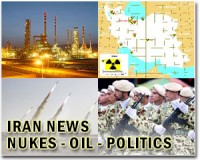| . |  |
. |
Washington (AFP) Nov 24, 2009 The Obama administration is wise to wait for Iran to respond clearly to a confidence-building nuclear offer in the hope the divided leadership in Tehran comes to its senses, analysts say. State Department officials said again Tuesday that the administration still hopes Iran will accept the UN-backed offer even though it balks at the terms of a deal it agreed to in principle nearly two months ago. The UN International Atomic Energy Agency (IAEA) brokered a deal under which Iran would send most of its low-enriched uranium (LEU) as of October to Russia and then France for conversion into fuel for a Tehran research reactor. Iran, although not formally, has effectively rejected that deal amid stiff opposition from senior officials who oppose sending the LEU in one go. They fear the West might renege on its side of the bargain. "Considering the domestic disarray of the Iranian regime, the major powers are wise to wait for an official response rather than reacting to reports about what 'top officials' are saying," analyst Deepti Choubey told AFP. The major powers are the so-called P5-plus-1, or the permanent five veto-wielding members of the UN Security Council -- the United States, Russia, China, Britain and France -- plus Germany Both Russia and China are more reluctant than the United States and the Europeans to impose further sanctions on Iran for its defiance of demands to halt uranium enrichment -- which the West fears masks a drive to build a bomb. "The major powers are unified in their desire for Iran to accept the original deal, which is an extraordinarily good deal for Iran," said Choubey, a non-proliferation specialist at the Carnegie Endowment for International Peace. "It is possible that Russia and China may be trying to persuade Iran to accept the deal to forestall the discomfort of addressing sanctions," she said in an email exchange. US State Department spokesman Ian Kelly said Washington is "still hoping that Iran... will choose to... engage the international community and resolve some of these (nuclear) concerns." Kelly told reporters that United States was looking to the "next important event," when the IAEA Board of Governors meet Thursday to discuss IAEA Director General Mohamed ElBaradei's assessment of Iran's nuclear program. Choubey said the board could decide that Iran has failed to comply with its legal obligations to the nuclear watchdog and it is even possible that Russia and China, unlike in 2005, would also vote in favor of the motion. "A finding of Iranian noncompliance then triggers the UN Security Council (UNSC) to act," she said. She recalled that UNSC Resolution 1887, passed unanimously when President Barack Obama chaired the council in September, puts a priority on tackling noncompliance. "Iran should realize that unlike previous years, the strategic context it is operating in has changed and the patience of certainly the Russians and maybe the Chinese is close to running out," she said. Iran specialist Patrick Clawson said Iranian officials took a "big step backward" on Tuesday when they said a simultaneous exchange of uranium inside Iran would guarantee Tehran would receive the fuel required for its reactor. Clawson, an analyst for the Washington Institute for Near East Policy, said that with Iran revealing that it distrusts even Russia with its uranium, "it makes it a lot easier to make the case" for sanctions. He said it was "quite an accomplishment" for the Obama administration to win broad backing for a proposal that would "stop the clock" on Iran's capacity to build an atomic bomb. Trita Parsi, president of the National Iranian American Council, said Iran has failed to inspire confidence in its handling of the proposal but the Obama administration is taking its time as a complex debate occurs in Tehran. The new administration, which has given Iran until next month to respond to its offer of diplomatic engagement, may start pushing harder for sanctions in January if Iran continues stonewalling, he told AFP. "I think there is a reluctance in the Obama administration to walk down that (sanctions) path, however. So I think they want to exhaust everything, but so far they have not gotten much from the Iranians to work with," Parsi said. Share This Article With Planet Earth
Related Links Learn about nuclear weapons doctrine and defense at SpaceWar.com Learn about missile defense at SpaceWar.com All about missiles at SpaceWar.com Learn about the Superpowers of the 21st Century at SpaceWar.com
 Iran's key sites exposed without S-300s
Iran's key sites exposed without S-300sTehran (UPI) Nov 23, 2009 The large-scale exercises Iran is currently conducting to test its air-defense network and assess its ability to protect its nuclear facilities appear to be little more than a show of defiance against the United States, Israel and Russia, its longtime key arms supplier. Without the advanced S-300PMU missiles that a fickle Moscow refuses to deliver, presumably because the Kremlin finds ... read more |
|
| The content herein, unless otherwise known to be public domain, are Copyright 1995-2009 - SpaceDaily. AFP and UPI Wire Stories are copyright Agence France-Presse and United Press International. ESA Portal Reports are copyright European Space Agency. All NASA sourced material is public domain. Additional copyrights may apply in whole or part to other bona fide parties. Advertising does not imply endorsement,agreement or approval of any opinions, statements or information provided by SpaceDaily on any Web page published or hosted by SpaceDaily. Privacy Statement |